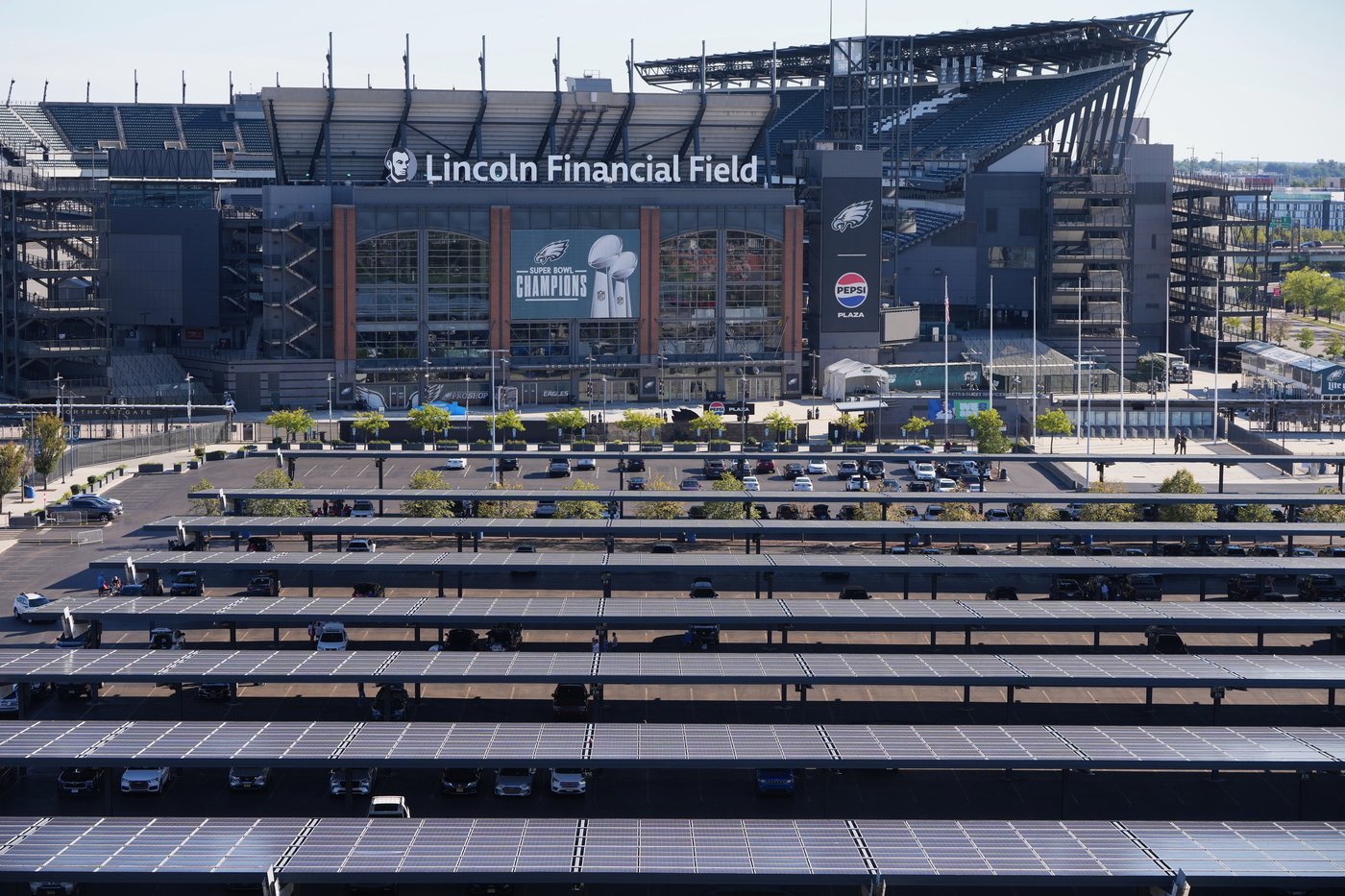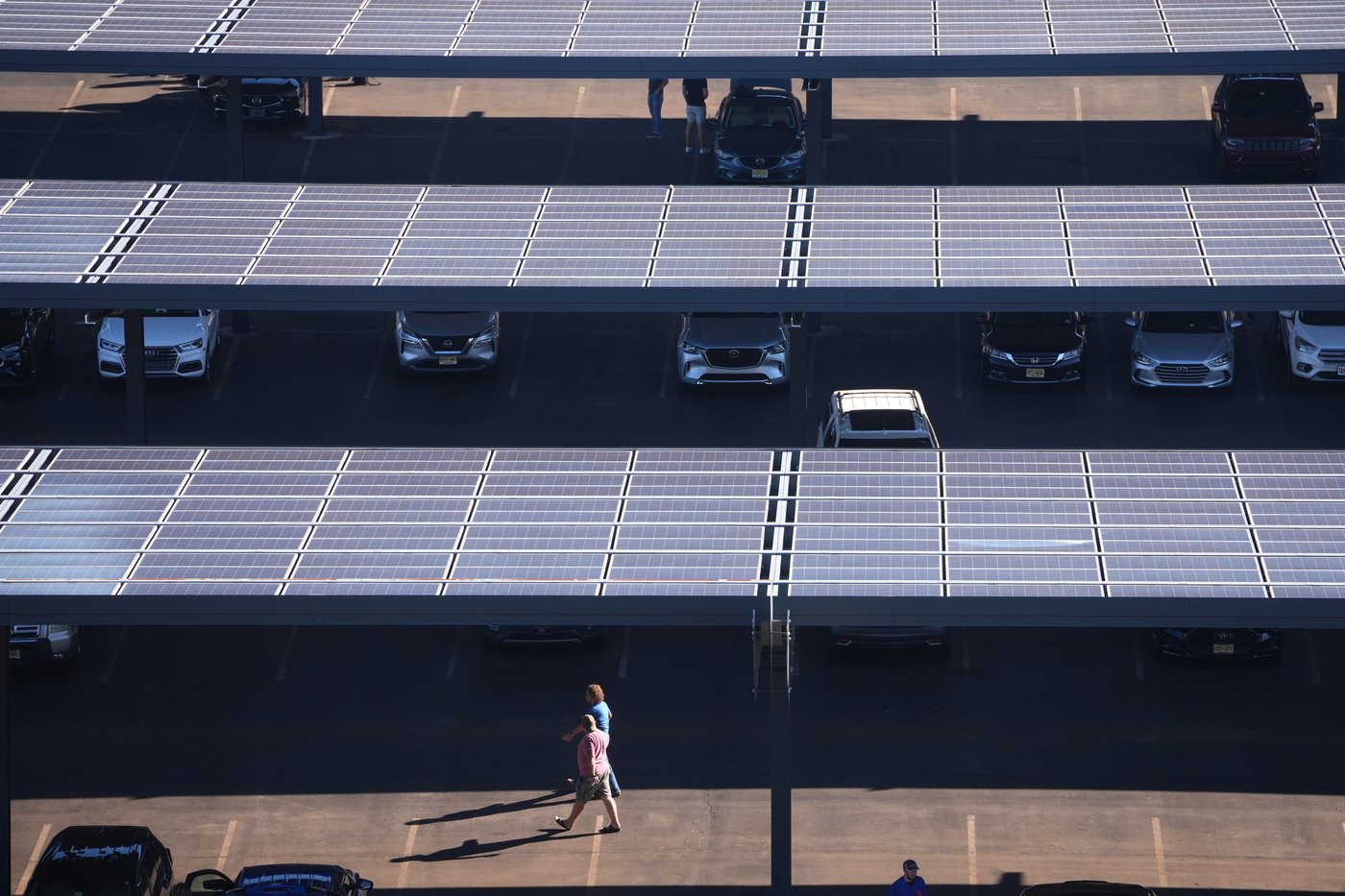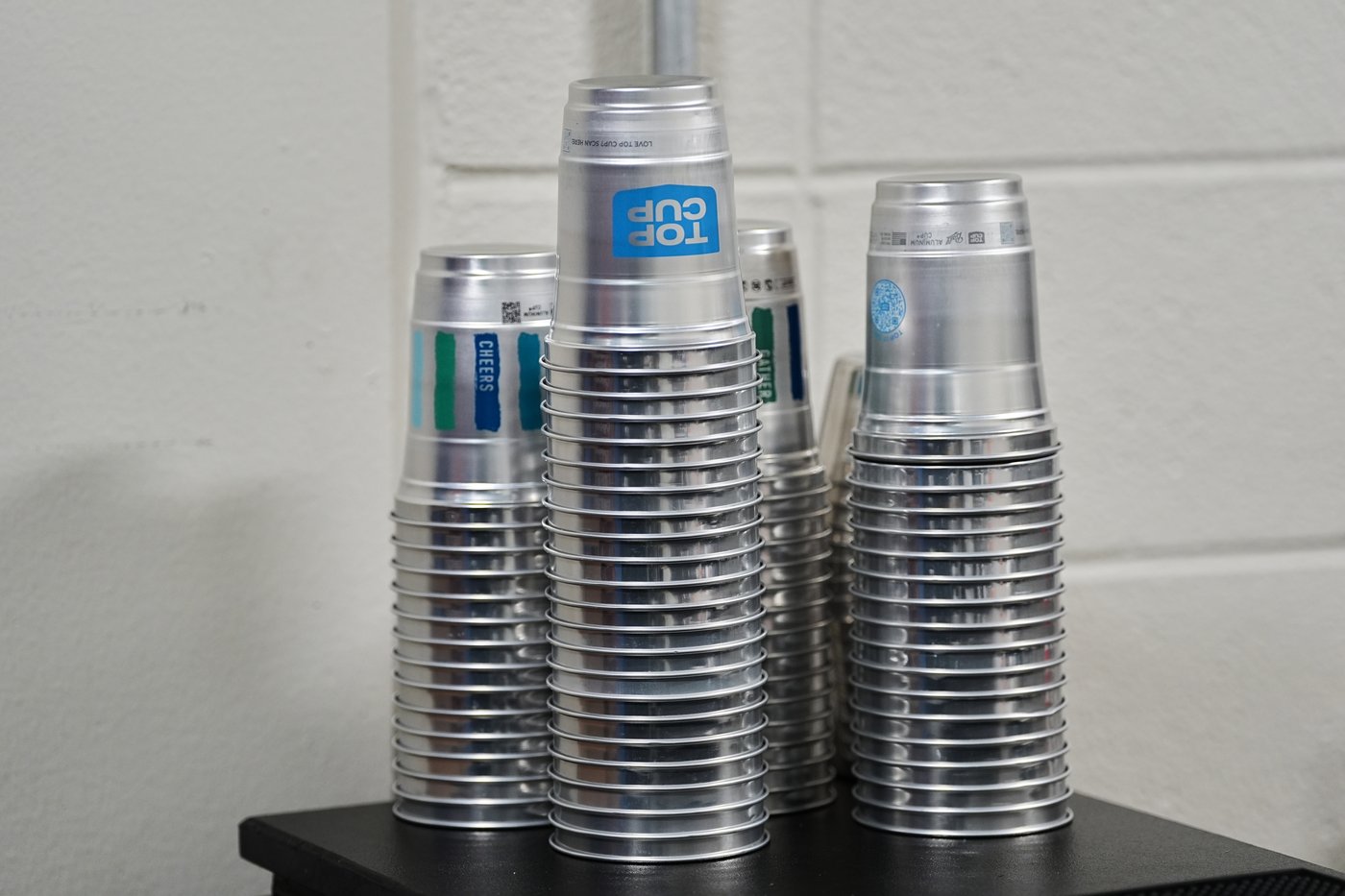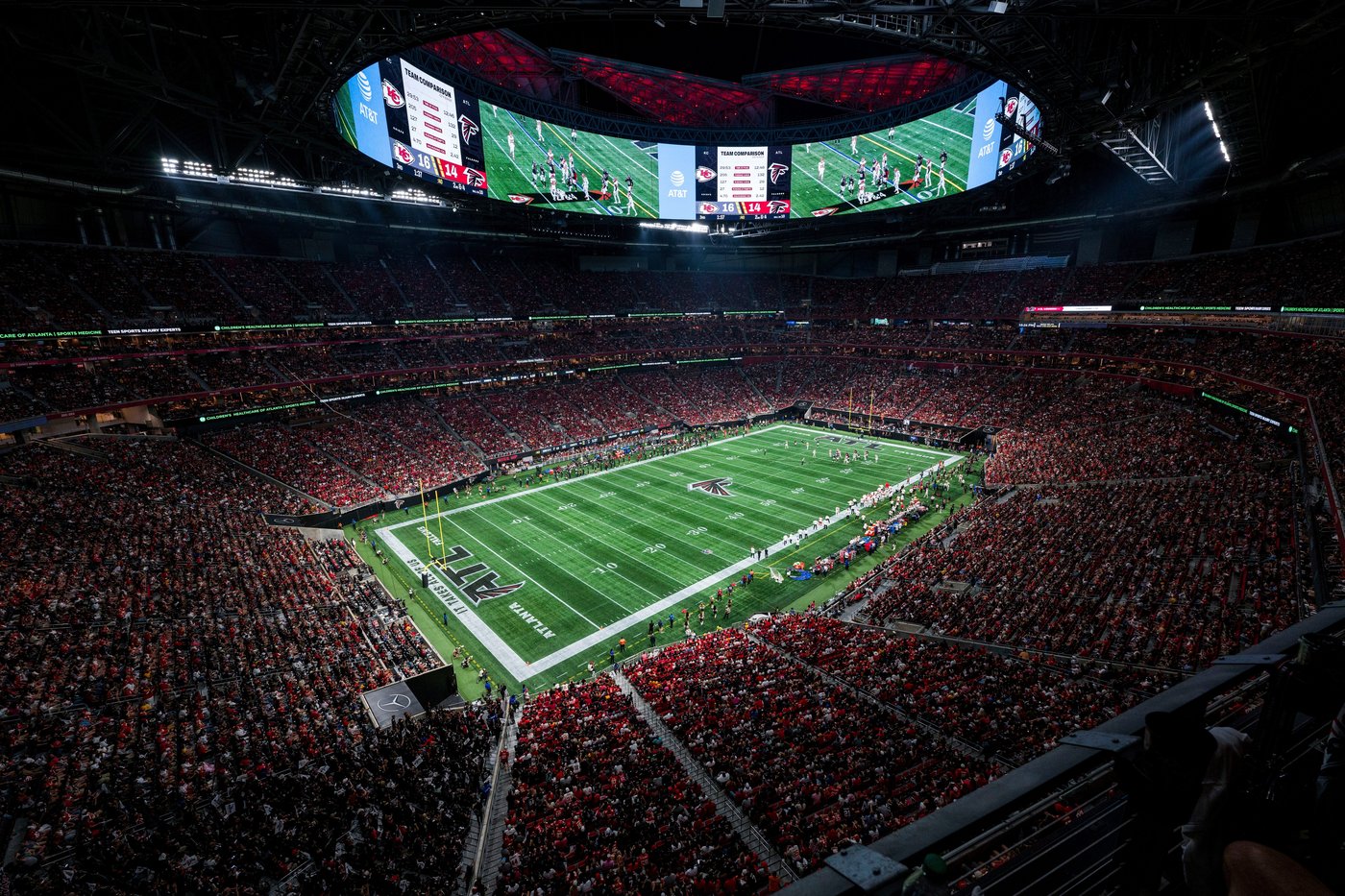Elevate your local knowledge
Sign up for the iNFOnews newsletter today!
[byline]

PHILADELPHIA (AP) — A wall of solar panels towered above a sea of green football jerseys as people filed into Lincoln Financial Field in Philadelphia for a recent Eagles home game. Inside, some fans snapped photos with an oversized Lombardi Trophy made out of recycled plastic collected from the stadium while others strolled to their seats carrying beverages in recyclable aluminum cups.
“These are real nice cups,” said Tre Simon, a fan who was impressed at how cold the aluminum cup kept his drink. “Keep this going … I think it’s perfect.”
Stadium staff manually sort recyclables, and an on-site compactor crushes aluminum so the metal can be sold for recycling. The Linc recycled 18 tons of aluminum in 2024 and reinvested the money into the stadium’s sustainability program.
The venue is among several NFL stadiums, also including those in Atlanta and Santa Clara, that have made strides in lowering their carbon footprints by installing solar panels and creating composting and recycling programs. Powering jumbotrons, bright lights and air conditioning requires huge amounts of energy, which can take its toll on the environment. Experts said the moves are a step in the right direction and encourage fans of the most-watched sport in the United States to try similar approaches at home.
“You always want to root for a team that’s doing good by the environment and the community,” said Brendan Gee, an Eagles fan at another home game.
“Why not recycle when you can, and solar panels are pretty cool I guess,” said Jakub Dzafic, another Eagles fan, who added: “Any NFL, NHL, NBA, MLB team should try and do that when they can.”
Solar panels and energy credits
Lincoln Financial Field is considered a leader in venue sustainability. The solar panels produce about 40% of the stadium’s energy annually and renewable energy credits are purchased to offset the rest, said Norman Vossschulte, the Eagles’ vice president of fan experience and sustainability.
“Our hope is that our efforts will inspire our fans to do the same and take some of their own actions. If we all did something, I think it’d make a big difference,” Vossschulte said.
Large sporting events can produce a lot of waste and consume massive amounts of energy. Asked whether a stadium can ever be truly sustainable, Tony Lamanna, construction management professor at Arizona State University, said “every bit counts. ”
“I don’t think you necessarily have to be net zero to be making an impact,” he said.
Lamanna said stadium sustainability encompasses both how the venue reduces its own footprint and how it influences fans’ habits.
“If you can model the right actions to the 80,000 fans or however many you have in your stadium, think of the impact,” he said.
Keeping waste out of landfills
Mercedes-Benz Stadium, home to the Falcons in Atlanta, became the first professional sports stadium internationally to achieve a Total Resource Use and Efficiency Platinum certification for diverting 90% or more of its waste from landfills.
“I’d say 98% of what you get out of a concession or point of sale is compostable,” said Adam Fullerton, the stadium’s vice president of operations.
The stadium has a garden that grows fruits and vegetables used by the culinary team, a 680,000-gallon (2,574,080 liter) cistern that collects rainwater that is used for irrigation and 4,000 solar panels. At games, fans who are spotted recycling can be featured on the stadium video board and win a signed jersey. Fullerton said fans seek out the sustainability team in hopes of being spotted.
“Start small and at least start doing something,” is Fullerton’s advice for venues that are interested in becoming more sustainable.
He said it costs about 10 cents per fan who attend events to run the zero waste program.
“In the grand scheme of things, that’s pretty cheap,” he said.
Waste created by tailgating outside the stadium remains a challenge because the parking lots can be outside the scope of the stadium’s waste management program. “It’s really difficult to control what a fan brings with them” to a tailgate, said Fullerton.
Fans can practice sustainability and minimize tailgate waste by packaging food and beverages in reusable containers and placing all waste and recyclables in their corresponding bins, taking public transit and adjusting home thermostats when they leave to save energy and money.
How sustainable marketing can lead to behavior changes
The visibility of stadium sustainability initiatives leads to a sense of group identity and increases the likelihood that fans will adopt that mindset as their own, said Karen Winterich, professor of sustainability and marketing at the Pennsylvania State University.
“One big thing we know about any sort of behavior change, and that includes sustainable behaviors, is that consumers are really motivated by identity, social norms and social pressures,” she said. When everyone puts their can into a stadium recycling bin, it increases the odds they’ll do so at home.
Climate change and renewable energy, especially solar and wind, are topics that are highly politicized. “I think it’s really strategic by the NFL … they’re talking about it for the benefits, but not in a polarizing way,” said Winterich. She said a strategy that often works to get people on board with sustainability is highlighting the benefits of on-site energy usage and how the local environment benefits from less pollution, composting and recycling.
NFL Green, the league’s sustainability program, aims to leave “a green legacy in the communities we visit,” said Anna Isaacson, the league’s senior vice president of social responsibility. For major events such as the Super Bowl, NFL Green hosts community feedback sessions that have inspired efforts such as the league financially supporting a coastal wetland project in Louisiana, where the 2025 Super Bowl was held.
The next Super Bowl will be held at the Levi’s Stadium in Santa Clara, California. Some of the stadium’s sustainable initiatives include 1,162 solar panels, a rooftop garden that yields about 10,000 pounds of crops annually, and recycling and composting 70% of all materials.
“The Bay Area is our home and it’s a unique place with tons of natural beauty. So our goal is to keep our community clean, not just for now, but for the future,” said Francine Melendez Hughes, executive vice president and general manager of Levi’s Stadium, home of the San Francisco 49ers.
___
The Associated Press’ climate and environmental coverage receives financial support from multiple private foundations. AP is solely responsible for all content. Find AP’s standards for working with philanthropies, a list of supporters and funded coverage areas at AP.org.




Want to share your thoughts, add context, or connect with others in your community?
You must be logged in to post a comment.